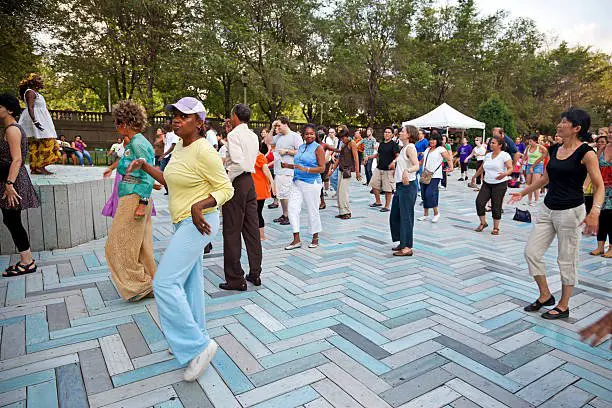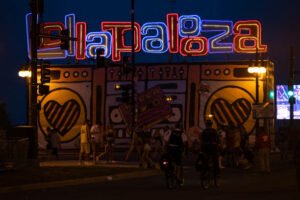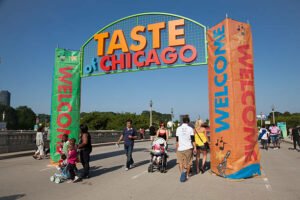A Guide to Grant Park Music Festival 2024.

Uncover the enchanting sounds of the Grant Park Music Festival, a celebrated summer tradition in Chicago. Immerse yourself in world-class performances set against the stunning backdrop of Millennium Park. Find a season filled with unforgettable concerts featuring a diverse repertoire of classical and contemporary masterpieces, all under the open sky.
Grant Park Music Festival
The Grant Park Music Festival, previously known as the Grant Park Concerts, is an annual ten-week classical music concert series held in Chicago, Illinois, United States. It showcases performances by the Grant Park Symphony Orchestra and Grant Park Chorus alongside guest performers and conductors. It proudly claims to be the sole free outdoor classical music concert series in the US. As a non-profit organization, the festival has been a cherished Chicago tradition since 1931, initially proposed by Mayor Anton Cermak to uplift spirits during the Great Depression. The tradition of symphonic Grant Park Music Festival concerts commenced in 1935.
Previously hosted at the Petrillo Music Shell in Grant Park, the Festival relocated to the Jay Pritzker Pavilion in the Millennium Park section of Grant Park for its 70th season in 2004. On occasion, it has also taken place at the Harris Theater. Throughout its history, the Festival has garnered support from different financial backers, utilized three main venues, and undergone a single name change. It has been nationally broadcast at times and has consistently featured performances by some of the most esteemed classical musicians worldwide. In a recent development, the organizers have agreed to release select Festival concerts on CD for public enjoyment.

Funding of the Grant Park Music Festival.
Initially, the series relied heavily on funding from the Park District, which oversaw various aspects, including performer payrolls, concert marketing, and orchestra auditions. Advertising expenses for printed media were supported by the Works Progress Administration (WPA) and the Federal Arts Program. Even after the WPA relief funding ended, the tradition of posters for Chicago Transit Authority buses, “L” trains, stations, and field houses persisted.
In 1977, the Grant Park Concerts Society emerged to centralize fundraising efforts for the Festival, managing both general marketing and membership programs. Through fundraising events and membership sales, it supplemented the Parks District funding, which ranged between $1.5 and $2.0 million. However, in 1996, the Park District and Festival staff terminated their association with the Concerts Society, resuming sole responsibility for marketing and fundraising.
By the late 1990s, the Festival gained recognition as a non-profit organization and established ties with the Chicago Department of Cultural Affairs, with the city department assuming some administrative duties. As of 2009, the Festival showcased the Grammy-nominated Grant Park Symphony Orchestra and Chorus and received sponsorship from the Chicago Park District, the Chicago Department of Cultural Affairs, and the Grant Park Orchestral Association. The park district covered over half of the operating costs, while the Department of Cultural Affairs provided logistical support. The remaining funds were sourced from private foundations, corporations, and individual patrons.
The park district covered the salaries of principal conductor Carlos Kalmar, chorus director Christopher Bell, and members of the orchestra and Grant Park Chorus. Additionally, the Festival received grants and broadcast fees. In 2010, out of the total $4 million budget, $2 million not covered by the Park District was raised through memberships and private philanthropy. This funding supported guest soloists and major collaborations.
History of the Grant Park Music Festival
The inaugural concert of the Grant Park Music Festival took place on July 1, 1935, following the completion of the original Petrillo Music Shell, featuring a march from Richard Wagner’s Tannhäuser. Over the years, both the National Broadcasting Company (NBC) and CBS Broadcasting Inc. (CBS) have broadcast these free concerts. The first summer season drew an impressive attendance of approximately 1.9 million for 65 concerts. Notably, in 1939, the Lily Pons concert set a single-concert attendance record with over 300,000 attendees, where she performed alongside her husband, Andre Kostelanetz, in what was described as the largest audience of her career. Similarly, David Rubinoff drew a significant crowd estimated at up to 225,000.
Presently, the Festival hosts approximately thirty concerts annually, with an estimated three hundred thousand in attendance. Maintaining its tradition, the Festival exudes a picnic-like atmosphere, fostering a sense of communal enjoyment. In its early years, the concerts were nationally broadcast on radio to numerous stations across the country.
Beyond its entertainment value, the Grant Park Music Festival has played a crucial role in providing musicians with a living wage. For instance, in 1938, when the minimum wage was $0.25/hour, musicians were paid $10 ($207.9 today) for a 2-hour concert. The Festival has also showcased the talent of various orchestras, including the Chicago Women’s Symphony in the 1940s, before establishing its professional Grant Park Symphony Orchestra in 1944. Nikolai Malko became the Festival’s first resident conductor in 1945, serving until 1954.
The Festival has experienced significant milestones, such as Van Cliburn’s appearance in 1958 following his victory at the International Tchaikovsky Competition, which propelled him to international fame. The 1960s marked a period of artistic exploration for the Festival under the direction of Edward Gordon, featuring avant-garde works by composers like Arnold Schoenberg, Sergei Prokofiev, Gustav Mahler, and Anton Webern. Thomas Peck led the newly formed Grant Park Chorus in 1962 until his passing in 1994, while Gordon introduced opera in concert as part of the Festival’s offerings in 1964. Additionally, interactive daytime Young People’s Concerts were introduced in 1963, engaging youth audience members under the guidance of Irwin Hoffman.

READ ALSO: Government Grants for Cosmetology School 2024.
Performers for the Grant Park Music Festival
The Grant Park Music Festival performance schedule spans ten consecutive weeks, featuring concerts on Wednesday, Friday, and Saturday from mid-June to mid-August. Presently, performances typically commence at 6:30 on Wednesdays and Fridays and at 7:30 on Saturdays, with reserved seating available for subscribers at the bandshell. Unclaimed seats are released to the public 15 minutes before each performance, fostering inclusivity and accessibility. The lawn seating, adorned with blankets and frequented by families, offers a free alternative viewing option.
Occasionally, the Harris Theater hosts Grant Park Music Festival events, expanding the festival’s reach and venue options. Moreover, the orchestra and chorus hold open rehearsals at the Pritzker Pavilion during the performance season. These sessions, often running from 11:00 am to 1:30 pm and then from approximately 2:30 or 3:00 pm until 5:00 pm, provide insight into the artistic process and allow audiences to witness the behind-the-scenes preparation. To enhance the educational experience, the Festival employs a team of trained guides, known as docents, who field questions and provide informative talks during the rehearsals. Programs are available for attendees, further enriching their understanding and appreciation of the music and performances.

Conclusion
The Grant Park Music Festival stands as a beacon of cultural excellence in the heart of Chicago, offering an unparalleled summer experience for music enthusiasts of all ages. From its rich history and breathtaking venue to its diverse programming and community outreach efforts, this festival continues to captivate audiences and inspire generations.
As we bid farewell to another remarkable season, we eagerly anticipate the future of this cherished tradition, knowing that its legacy will continue to resonate for years to come. Join us next summer as we celebrate the enduring power of music at the Grant Park Music Festival.
Frequently asked questions
1. What is the Grant Park Music Festival?
The Grant Park Music Festival is a renowned outdoor music event held annually in Chicago’s Millennium Park. It features various classical and contemporary music performances, showcasing world-class musicians and orchestras.
2. When does the Grant Park Music Festival take place?
The festival typically runs from June to August, offering a summer-long series of concerts and events.
3. Where is the Grant Park Music Festival held?
The festival primarily occurs at the Jay Pritzker Pavilion in Millennium Park, providing a stunning backdrop of Chicago’s skyline.
4. Are there admission fees for the concerts?
No, most concerts at the Grant Park Music Festival are free and open to the public, making it accessible to everyone.
5. What performances can I expect to see at the festival?
The festival offers diverse musical genres, including classical orchestral works, chamber music, choral performances, contemporary compositions, and more.
6. Can I bring food and drinks to the concerts?
Yes, attendees can bring their food and non-alcoholic beverages to enjoy during the performances. However, alcohol is typically available for purchase on-site.
7. Is seating provided at the concerts?
While limited seating is available at the Jay Pritzker Pavilion, many attendees bring blankets or lawn chairs to relax on the Great Lawn.
8. Are there any special events or educational programs associated with the festival?
Yes, the Grant Park Music Festival often hosts special events, pre-concert talks, and educational initiatives aimed at engaging audiences and fostering a deeper appreciation for music.
9. How can I stay updated on the festival schedule and programming?
You can visit the official Grant Park Music Festival website or follow them on social media platforms for the latest updates, concert schedules, and announcements. Additionally, signing up for their newsletter is a great way to stay informed.



